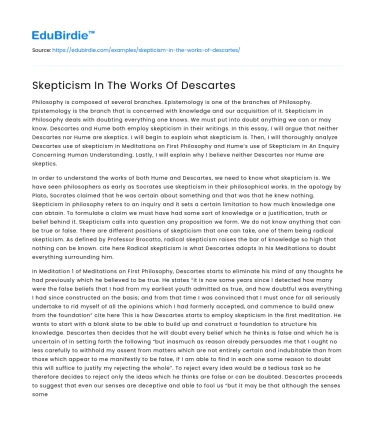Philosophy is composed of several branches. Epistemology is one of the branches of Philosophy. Epistemology is the branch that is concerned with knowledge and our acquisition of it. Skepticism in Philosophy deals with doubting everything one knows. We must put into doubt anything we can or may know. Descartes and Hume both employ skepticism in their writings. In this essay, I will argue that neither Descartes nor Hume are skeptics. I will begin to explain what skepticism is. Then, I will thoroughly analyze Descartes use of skepticism in Meditations on First Philosophy and Hume’s use of Skepticism in An Enquiry Concerning Human Understanding. Lastly, I will explain why I believe neither Descartes nor Hume are skeptics.
In order to understand the works of both Hume and Descartes, we need to know what skepticism is. We have seen philosophers as early as Socrates use skepticism in their philosophical works. In the apology by Plato, Socrates claimed that he was certain about something and that was that he knew nothing. Skepticism in philosophy refers to an inquiry and it sets a certain limitation to how much knowledge one can obtain. To formulate a claim we must have had some sort of knowledge or a justification, truth or belief behind it. Skepticism calls into question any proposition we form. We do not know anything that can be true or false. There are different positions of skepticism that one can take, one of them being radical skepticism. As defined by Professor Brocatto, radical skepticism raises the bar of knowledge so high that nothing can be known. cite here Radical skepticism is what Descartes adopts in his Meditations to doubt everything surrounding him.
Save your time!
We can take care of your essay
- Proper editing and formatting
- Free revision, title page, and bibliography
- Flexible prices and money-back guarantee
In Meditation 1 of Meditations on First Philosophy, Descartes starts to eliminate his mind of any thoughts he had previously which he believed to be true. He states “it is now some years since I detected how many were the false beliefs that I had from my earliest youth admitted as true, and how doubtful was everything I had since constructed on the basis; and from that time I was convinced that I must once for all seriously undertake to rid myself of all the opinions which I had formerly accepted, and commence to build anew from the foundation” cite here This is how Descartes starts to employ skepticism in the first meditation. He wants to start with a blank slate to be able to build up and construct a foundation to structure his knowledge. Descartes then decides that he will doubt every belief which he thinks is false and which he is uncertain of in setting forth the following “but inasmuch as reason already persuades me that I ought no less carefully to withhold my assent from matters which are not entirely certain and indubitable than from those which appear to me manifestly to be false, if I am able to find in each one some reason to doubt this will suffice to justify my rejecting the whole”. To reject every idea would be a tedious task so he therefore decides to reject only the ideas which he thinks are false or can be doubted. Descartes proceeds to suggest that even our senses are deceptive and able to fool us “but it may be that although the senses sometimes deceive us concerning things which are hardly perceptible, or very far away, there are yet many others to be met with as to which we cannot reasonably have any doubt, although we recognize them by their means”. What is Descartes trying to say here? Well, for example, when we look at an object from a distance, we see it as a small object; however our minds already know that that object is not that size because we already recognize it by its true means. This is what he was trying to imply that even our senses such as our visions are capable of deceiving us.
Descartes also points out those even dreams are deceiving because sometimes we dream what almost seems like reality “I have in sleep been deceived by similar illusions, and in dwelling carefully on this reflection I see so manifestly that there are no certain indications by which we may clearly distinguish wakefulness from sleep”. Surely enough this has happened to many of us. We dream as if we were in a real life situation that we cannot distinguish dreams from reality, therefore we can be deceived as well. Our senses have deceived us because they cannot tell when we are awake and when we are asleep. Descartes then comes to the conclusion that what if our whole existence is merely a dream that we have not awoken from.
In an Enquiry Concerning Human Understanding, Hume dedicates wholly three sections to his view on skeptical doubts. In section 4, skeptical doubts about the operations of the understanding, Hume begins by stating that “All the objects of human reason or enquiry fall naturally into two kinds, namely relations of ideas and matters of fact.” Cite here. At once, Hume suggests that we don’t need to do much thinking to be able to relate ideas together such as that which involves Geometry, Algebra, and Arithmetic. Those ideas or “propositions” can be discovered purely by thinking with no need to attend to anything that actually exists anywhere in the universe. Cite here. This is what he concludes to be relations of ideas. These types of ideas can be known with certainty; discovered by thought alone, and can be formed a priori or without the need of having experienced it.






 Stuck on your essay?
Stuck on your essay?

